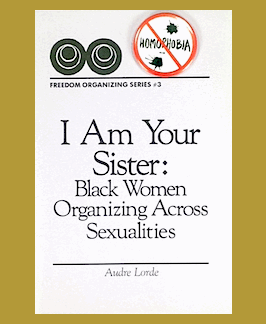 Published in 1985, “I am Your Sister” is the third pamphlet included in Kitchen Table: Women of Color Press’s Freedom Organizing Series. The piece is based on a speech Lorde gave at the Women’s Center of Medgar Evers College in New York City. It addresses divisiveness in the feminist movement, specifically in relation to heterosexism and homophobia which Lorde names as “two grave barriers to organizing among Black women” (3).
Published in 1985, “I am Your Sister” is the third pamphlet included in Kitchen Table: Women of Color Press’s Freedom Organizing Series. The piece is based on a speech Lorde gave at the Women’s Center of Medgar Evers College in New York City. It addresses divisiveness in the feminist movement, specifically in relation to heterosexism and homophobia which Lorde names as “two grave barriers to organizing among Black women” (3).
From the very beginning, Lorde speaks of a need to redefine the framework through which we examine and determine identity. She illustrates a need “to deal constructively with the genuine differences between us and to recognize that unity does not require that we be identical to one another” (3). Lorde clarifies that effective feminism will not be built around ignoring intricate intersections of identity but rather around embracing and wrestling with them. She exemplifies this approach in the context of her own lived experience, writing, “When I say I am a Black feminist; I mean I recognize that my power as well as my primary oppressions come as a result of my Blackness as well as my womanness, and therefore my struggles on both of these fronts are inseparable” (4). This definitive statement is a near direct precursor to the notion of “intersectionality,” which Kimberly Crenshaw coined four years after “I am Your Sister” in a 1989 article called, “Demarginalizing the Intersection of Race and Sex: A Black Feminist Critique of Anti-discrimination Doctrine, Feminist Theory and Antiracist Politics.”
The message Lorde desires to convey in “I am Your Sister” is apparent: “We cannot afford to waste each other’s energies in our common battles” (7). She asks her audience, “How do we organize around our differences, neither denying them nor blowing them up out of proportion?” (7) and upholds that the solution is ultimately “an effort of will” (7). Lorde concludes the piece with characteristic eloquence and clarity, writing in reference to stereotypes about lesbians,
Those stereotypes are yours to solve, not mine, and they are a terrible and wasteful barrier to working together. I am not your enemy. We do not have to become each other’s unique experiences and insights in order to share what we have learned through our particular battles for survival as Black women……I do not want to be tolerated, nor misnamed. I want to be recognized. I am a Black Lesbian, and I am your sister. (8)
The use of “and” and the italicization of the “am” here are crucial. These linguistic choices clarify what Lorde believes to be inherent to identity on the level of form: that it is both aspects that are inalienable, and their existence is active and undeniable.
Source: Lorde, Audre. I Am Your Sister: Black Women Organizing across Sexualities. 1st ed., Kitchen Table, Women of Color Press, 1985.
